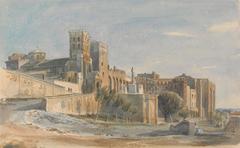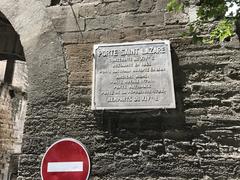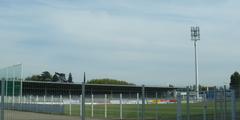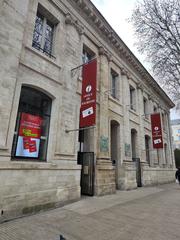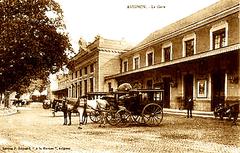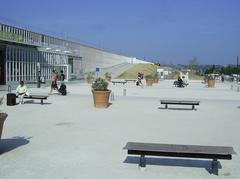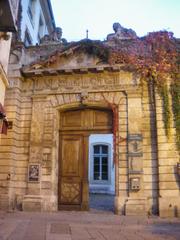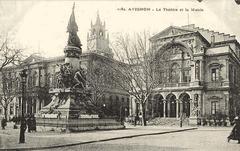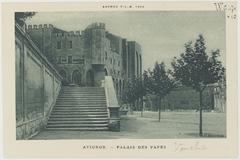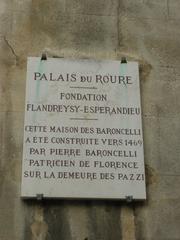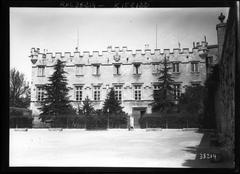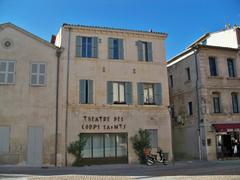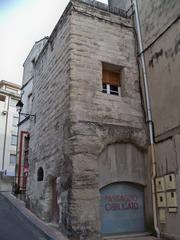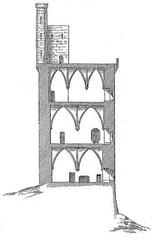Departmental Archives of Vaucluse: Visiting Hours, Tickets, and Historical Significance in Avignon, France
Date: 15/06/2025
Introduction
The Departmental Archives of Vaucluse, located in Avignon, are a vital institution for the preservation and celebration of Provençal history. Established after the French Revolution, these archives have evolved from their historic home within the Palais des Papes—a UNESCO World Heritage Site—to the cutting-edge Memento facility in Avignon’s Agroparc district. This guide provides an in-depth overview of the archives’ historical evolution, architectural context, collections, and practical information for visitors, including updated visiting hours, ticketing, accessibility, and travel tips. Whether you are a researcher, student, or cultural enthusiast, the Departmental Archives of Vaucluse offer an immersive journey through centuries of regional and national heritage.
Table of Contents
- Introduction
- Historical Development and Evolution
- From the Palais des Papes to Memento: Architectural Context
- Collections and Research Opportunities
- Visiting Information
- Visitor Tips
- Frequently Asked Questions (FAQ)
- Conclusion
- References and Further Reading
Historical Development and Evolution
The Departmental Archives of Vaucluse were founded in the aftermath of the French Revolution as part of a nationwide effort to centralize and safeguard documents of legal, administrative, and historical importance. Before their establishment, crucial documents were often scattered and at risk of loss or damage. The law of 5 Brumaire An V (26 October 1796) marked the creation of departmental archives across France, including Vaucluse, ensuring the systematic preservation of public records (AGS Records Management). The archives expanded over time, notably following the 1983 law that placed them under departmental authority while maintaining state oversight.
The collections now include a wide array of materials: parish registers, civil status records, military conscription lists, cadastral maps, notarial deeds, photographs, and private collections, chronicling the region’s journey from papal rule through revolutionary upheaval, Napoleonic reforms, world wars, and modern times (FranceArchives; Inventaire-sommaire des Archives départementales de Vaucluse).
From the Palais des Papes to Memento: Architectural Context
Historical Setting: Palais des Papes
For over a century, the archives were housed in the northern section of the Palais des Papes, the grand 14th-century Gothic palace that served as the seat of the Avignon Papacy (Avignon-et-Provence). The palace’s fortress-like architecture, with its soaring chapels, consistory hall, papal apartments, and defensive towers, provided both symbolic gravitas and practical security for the archives (Journées du Patrimoine).
The Move to Memento: Modernization and Accessibility
Recognizing the need for improved conservation and public amenities, the Departmental Archives began relocating in 2024 to the Memento building in Avignon’s Agroparc district. Designed by Agence Gautier + Conquet and spanning over 10,600 square meters, Memento is purpose-built for archival preservation, featuring advanced climate control, digital transformation infrastructure, ergonomic research spaces, and full accessibility (archives.vaucluse.fr; Vaucluse.fr).
The new facility also brings together archaeological services and museum reserves, supporting interdisciplinary research and community engagement.
Collections and Research Opportunities
The Departmental Archives of Vaucluse steward over 40 kilometers of documents, including:
- Genealogical Records: Parish and civil status registers.
- Military and Legal Documents: Conscription lists, notarial deeds, and legal proceedings.
- Cartographic Holdings: Napoleonic cadastral maps and topographical surveys.
- Photographic and Private Collections: Including Fonds Chaffard and Fonds Christian Jaureguy.
- Special Collections: Materials relating to regional events such as the reforestation of Mont Ventoux and the impacts of the World Wars.
Many resources are being digitized, increasing access for remote researchers (archives.vaucluse.fr).
Visiting Information
Hours and Admission
- Memento Facility (2025): Open Tuesday to Saturday, from 9:00 AM to 5:00 PM.
- Closed on Sundays, Mondays, and major holidays.
- Admission: Free for all visitors; access to archival materials for research requires prior appointment.
Accessibility
- The Memento building is fully accessible, with wheelchair ramps, elevators, and adapted restrooms.
- The historic Palais des Papes location had some accessibility limitations; the new facility is designed for universal access.
Getting There
- Public Transport: Regular buses connect Avignon city center with the Agroparc district.
- By Car: Parking is available near the Memento facility.
- From the City Center: The new building is a short drive or bus ride from central Avignon and other major historical sites.
Guided Tours and Events
- Guided tours and educational workshops are offered periodically; check the official archives website for schedules.
- The archives participate in major cultural events, such as the European Heritage Days (Journées du Patrimoine).
Visitor Tips
- Book Appointments: Schedule your research visits in advance, especially for specific document requests.
- Identification: Bring valid ID for access to reading rooms and research facilities.
- Photography: Always confirm with staff before photographing documents.
- Language: Most materials are in French; consider bringing a translation app or phrasebook.
- Amenities: The new building offers modern amenities; nearby the archives, Avignon’s city center provides a variety of dining and shopping options.
Frequently Asked Questions (FAQ)
Q: Are tickets required to visit the Departmental Archives of Vaucluse?
A: No, entry is free of charge.
Q: What are the visiting hours?
A: Open Tuesday to Saturday from 9:00 AM to 5:00 PM; closed Sundays, Mondays, and public holidays.
Q: Is the site accessible for visitors with disabilities?
A: Yes, the Memento facility is fully accessible.
Q: Are guided tours available?
A: Yes, guided tours and workshops are offered. Check the archives’ website for current details.
Q: Can I access the archives digitally?
A: Many resources are being digitized; check the official digital portal for updates.
Q: Are there special events or exhibitions?
A: The archives regularly host exhibitions and participate in cultural events. Visit the official website for the latest news.
Conclusion
The Departmental Archives of Vaucluse are a cornerstone of Avignon’s historical and cultural identity. From their revolutionary origins to their current transformation at Memento, the archives provide invaluable resources for researchers and the public alike. The move to a modern, inclusive facility ensures optimal preservation of the region’s documentary heritage while offering enhanced access and engagement opportunities. Whether you are tracing family roots, exploring the region’s rich history, or seeking a deeper cultural experience in Avignon, the Departmental Archives of Vaucluse are an essential destination.
For the latest information, visiting details, and digital resources, consult the official archives website.
References and Further Reading
- FranceArchives - Departmental Archives of Vaucluse
- Inventaire-sommaire des Archives départementales de Vaucluse
- Departmental Archives of Vaucluse digital resources
- Vaucluse.fr - New Departmental Archives at Agroparc
- Avignon-et-Provence - History of Avignon
- Journées du Patrimoine - Departmental Archives of Vaucluse
- AGS Records Management - History of French Departmental Archives
- Provence Guide - Departmental Archives
- Vaucluse Department - Memento Facility

